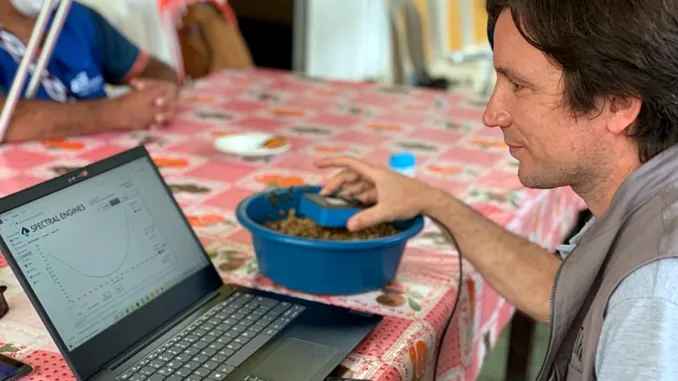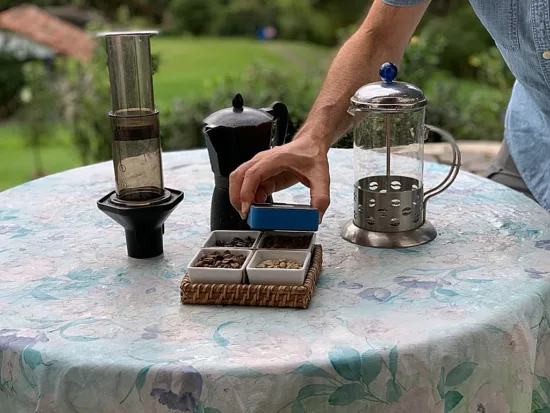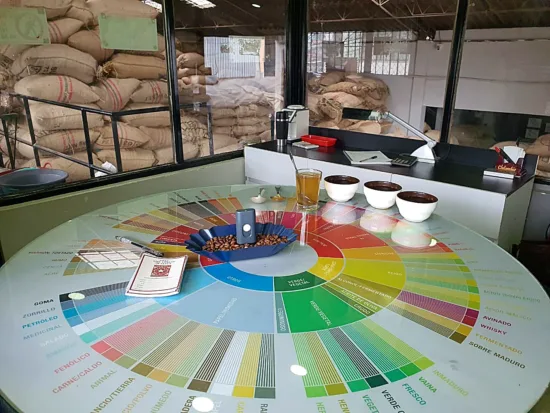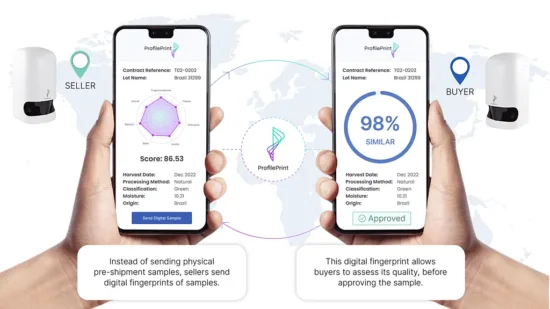
In the second part of this series, we explore AI’s potential impact on coffee traders, producers, and Q Graders.
BY VASILEIA FANARIOTI
SENIOR ONLINE CORRESPONDENT
Cover photo courtesy of Demetria
In the first part of our exploration into the impact of artificial intelligence (AI) on the coffee industry, we uncovered a landscape of innovation, optimization, and precision. With new technology benefiting coffee-machine manufacturing and aiming to enhance the art of roasting, AI seems to have the potential to reshape many facets of the coffee journey. Now in the second part of our story, we delve deeper into the potential impact and influence of AI on coffee traders, producers, and warehouse facilities, as well as Q Graders.

Data-Driven Decision-Making Through AI
By collecting and analyzing large-scale data, AI solutions also facilitate informed decision-making throughout the coffee value chain. From farm-management practices to trading strategies and roasting profiles, AI-powered analytics aim to help stakeholders optimize processes and enhance quality. The insights derived from AI-driven data analysis enable proactive adjustments and improvements, which can ensure efficiency and consistency in coffee production and trade.
Demetria, an Israeli-Colombian agrotechnology startup, harnesses AI to match each coffee bean profile with the industry-standard coffee flavor wheel. Utilizing a handheld near-infrared (NIR) spectrometer and a machine learning algorithm, Demetria creates a chemical “fingerprint“ of each bean. The fingerprint is mapped to the eventual taste of the coffee post-roasting and brewing. The platform then compiles organized data into a quality and traceability data cloud, gathering insights from Q Graders and offering a comprehensive solution for informed decision-making.

Streamlined Grading Process
AI-driven solutions can potentially help streamline the grading process by reducing time and resource inefficiencies associated with traditional methods such as sample transport and manual assessments. Through AI-automated grading systems, green coffee samples can be evaluated swiftly and accurately, minimizing human error and subjectivity. This streamlined approach can help to increase productivity and ensure consistent quality assessment across different batches and origins.
Solutions such as ProfilePrint and Agrivero’s VeroLab use AI to perform molecular analysis and evaluate green coffee samples. ProfilePrint requires 50 grams of coffee beans; Agrivero’s VeroLab offers results within 4 minutes. These tools streamline the grading process, reducing time and resource inefficiencies.

Enhanced Traceability & Accessibility
Beyond their initial purpose, the above tools aim to enhance traceability as well. By digitizing data and creating comprehensive profiles for each coffee, these tools help provide a transparent and traceable record of coffee quality attributes. This facilitates better tracking of beans from farm to cup, ultimately enhancing overall traceability in the coffee supply chain. This transparency fosters trust and allows stakeholders to identify and address quality issues more effectively.
AI integration in the coffee industry has the potential to enhance decision-making for traders and optimize production for producers. It could also streamline operations for warehouse facilities, and ensure quality for Q Graders and roasters. However, it’s worth noting that while AI technology shows promise, its current usage is predominantly among larger players in the industry.
Although still in its early stages, AI technology is anticipated to become more mainstream, which would make it more affordable and accessible to smaller players in the coffee industry. This democratization of AI tools may foster a more inclusive and innovative landscape for the entire coffee industry.
ABOUT THE AUTHOR
Vasileia Fanarioti (she/her) is a senior online correspondent for Barista Magazine and a freelance copywriter and editor with a primary focus on the coffee niche. She has also been a volunteer copywriter for the I’M NOT A BARISTA NPO, providing content to help educate people about baristas and their work. You can follow her adventures at thewanderingbean.net.
Subscribe and More!
Out now: It’s the February + March 2024 issue of Barista Magazine! Read it for free with our digital edition. And for more than three years’ worth of issues, visit our digital edition archives here.
You can order a hard copy of the magazine through our online store here, or start a subscription for one year or two.


